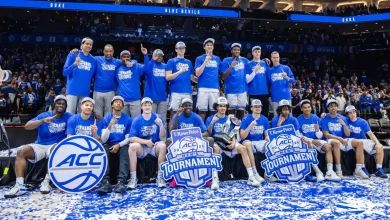CONGRATULATIONS: Former Oklahoma Head Coach Barry Switzer Honored with Prestigious National Football Foundation Gold Medal.

In the world of college football, few names resonate with the same level of respect, admiration, and legacy as Barry Switzer. As one of the most successful and influential figures in the history of the sport, Switzer’s impact extends far beyond the football field. Recently, the National Football Foundation (NFF) awarded Switzer one of the highest honors in the sport—the prestigious NFF Gold Medal. This honor comes as a fitting recognition of Switzer’s remarkable career, both on and off the field, and further solidifies his place as one of college football’s greatest coaches.
For those who have followed Switzer’s career, this award is a long-overdue acknowledgment of his contributions to the sport, his leadership, and his dedication to developing athletes not just as players, but as individuals. With a career that spans decades, from his days as a young assistant coach to his legendary tenure as the head coach of the University of Oklahoma, Switzer’s influence has shaped the landscape of college football in profound ways.
Barry Switzer: A Legacy Built on Success
Barry Switzer’s journey to becoming one of the most storied figures in college football began in the late 1960s, when he first joined the University of Oklahoma as an assistant coach under the legendary Chuck Fairbanks. Little did anyone know at the time that Switzer’s career would one day eclipse that of many of his contemporaries, placing him among the all-time greats in college football coaching history.
Switzer took over as the head coach of the Oklahoma Sooners in 1973, a position he would hold until 1988. His tenure was marked by unprecedented success. During his 16 years as head coach, Switzer compiled a remarkable record, leading the Sooners to three national championships (1974, 1975, and 1985) and four Big Eight Conference titles. His success in the postseason, particularly in the Orange Bowl and the Cotton Bowl, became the stuff of legend. Switzer’s teams were known for their high-powered offenses, tough defenses, and a culture of winning that permeated every aspect of the program.
One of the hallmarks of Switzer’s coaching was his ability to get the best out of his players, both athletically and personally. He was known for his innovative approach to coaching, integrating a blend of discipline, motivation, and strategic insight that made his teams not just successful, but consistently dominant. His focus on team unity, his unwavering belief in the abilities of his athletes, and his knack for getting the most out of his players made him a beloved figure within the Oklahoma program and beyond.
A Coach of Championships
Switzer’s ability to build championship-caliber teams was a defining characteristic of his career. Perhaps his most memorable achievement came in 1974 when he led the Sooners to their first national championship under his leadership. The 1974 team was one of the most dominant in college football history, featuring a mix of dynamic offensive playmakers and a rock-solid defense. It was a testament to Switzer’s ability to recruit top-tier talent, develop that talent, and motivate his players to perform at their peak.
The following year, Switzer’s Sooners went on to win another national championship, solidifying his place as one of the top coaches in the country. His coaching philosophy emphasized a balanced attack on both sides of the ball, something that became a hallmark of his teams throughout his career. The 1975 season featured a high-flying offense led by future NFL stars, and Switzer’s tactical brilliance was on full display as he guided his team to yet another title.
Switzer’s success wasn’t limited to the mid-1970s. In 1985, after a period of rebuilding, Switzer’s Sooners captured their third national championship under his watch. The 1985 team, led by standout players such as quarterback Jamelle Holieway and running back Marcus Dupree, was once again a force to be reckoned with. Switzer’s ability to adapt to the changing dynamics of the game while maintaining a consistent level of excellence was a key factor in his continued success.
But it wasn’t just championships that defined Switzer’s career. It was his ability to develop players and prepare them for the next level. Many of the athletes Switzer coached went on to enjoy successful careers in the NFL, further cementing his legacy as a coach who could take raw talent and turn it into greatness. He was a key figure in the development of countless future stars, including NFL Hall of Famers like Barry Sanders and Troy Aikman.
The National Football Foundation Gold Medal: A Well-Deserved Honor
The NFF Gold Medal is one of the highest honors an individual can receive in the world of college football. It is awarded to those who have made significant contributions to the sport, not just as players and coaches, but also in terms of their leadership, integrity, and dedication to the growth of the game. Past recipients of the prestigious award include legendary figures such as Vince Lombardi, Joe Paterno, and Tom Osborne. With this distinction, Barry Switzer joins an elite group of individuals who have left an indelible mark on the history of college football.
For Switzer, receiving the NFF Gold Medal is a reflection of his lifelong commitment to the game and his profound influence on the sport. It’s a recognition of the championships he won, the players he developed, and the lasting impact he had on the culture of college football. It’s also an acknowledgment of his contributions to the broader football community, including his role in helping to elevate the profile of college football, particularly within the state of Oklahoma.
The announcement of Switzer’s NFF Gold Medal comes as no surprise to those who have followed his career. His ability to build championship teams, his impact on the lives of his players, and his legacy as a coach and mentor are just some of the reasons why this award is so fitting. But more than that, the NFF Gold Medal serves as a reminder of Switzer’s long-standing commitment to excellence in college football, a commitment that has inspired generations of athletes, coaches, and fans.
The Impact on College Football
Barry Switzer’s influence on college football extends far beyond his time as head coach of Oklahoma. Switzer helped shape the game in ways that are still felt today, not just through his on-field success, but through his approach to coaching and leadership. He was one of the pioneers of the modern offense, helping to popularize the wishbone offense, a system that became synonymous with Oklahoma football during his tenure. His ability to innovate and adapt to the evolving game made him a trailblazer in college football.
Switzer also played a significant role in the development of college football’s national recruiting landscape. His ability to identify talent from all corners of the country, particularly from regions that were previously untapped, helped to elevate Oklahoma’s program to the level of elite competition. His recruiting strategies, combined with his ability to foster a family-oriented culture within the program, helped to attract some of the best players in the country. Many of the athletes who played under Switzer went on to achieve greatness in the NFL, further underscoring his ability to recognize and nurture talent.
But perhaps Switzer’s greatest legacy is the way in which he impacted the lives of his players. Beyond his coaching acumen, he was known for his commitment to developing well-rounded individuals. He emphasized not only athletic success but also academic achievement and personal growth. Switzer’s mentorship extended far beyond the football field, and many of his former players speak fondly of his influence on their lives both as athletes and as people. The relationships Switzer built with his players are among his most enduring achievements, and they are a testament to his character and dedication as a coach.
Switzer’s Post-Coaching Life
Though Switzer retired from coaching in 1988, his impact on the world of college football has never waned. He remained a prominent figure in the sport, continuing to offer insight and commentary on college football’s evolving landscape. Switzer’s involvement in football has expanded beyond just coaching, as he has remained active in various roles, including serving as a mentor to new coaches and offering his expertise to younger generations of players.
Even after stepping away from the sidelines, Switzer’s legacy continues to inspire those who follow in his footsteps. His ability to connect with players, his innovative approach to the game, and his commitment to building championship-caliber teams have set a standard for coaches who seek to make an impact in college football. His time at Oklahoma will always be remembered, but it is his influence on the sport as a whole that ensures his place as one of the greats in football history.
A Fitting Recognition
The NFF Gold Medal is more than just a recognition of Barry Switzer’s exceptional career as a coach. It is a tribute to his dedication, leadership, and the lasting impact he has had on the game of college football. As he joins an elite group of past recipients, Switzer’s legacy continues to be celebrated, not just for his championships, but for the way he transformed the sport and inspired countless individuals to follow in his footsteps.
For Oklahoma fans, this award is a reminder of the golden era of Sooners football under Switzer’s leadership. It is a reminder of the championships, the iconic players, and the unparalleled success that defined an era of college football. For Barry Switzer, the NFF Gold Medal is a well-deserved recognition of a lifetime spent dedicated to the game he loves.
As college football continues to evolve, Switzer’s contributions will always be remembered. And as long as the sport is played, the influence of Barry Switzer will be felt for generations to come. Congratulations to Barry Switzer, a true legend of the game, on receiving the National Football Foundation Gold Medal.









